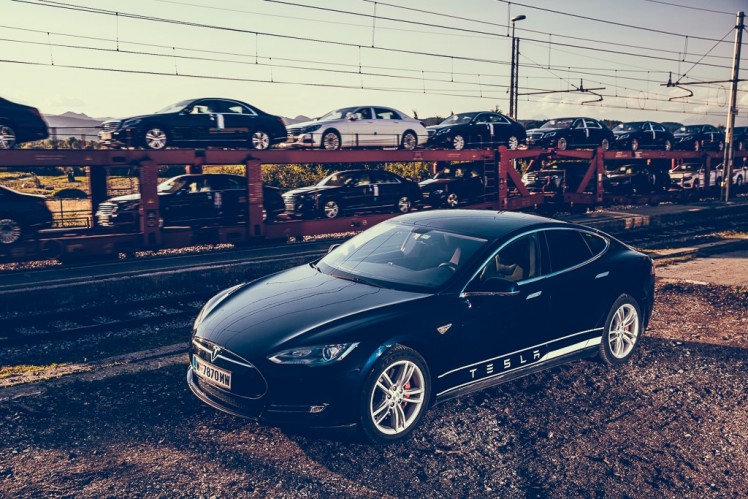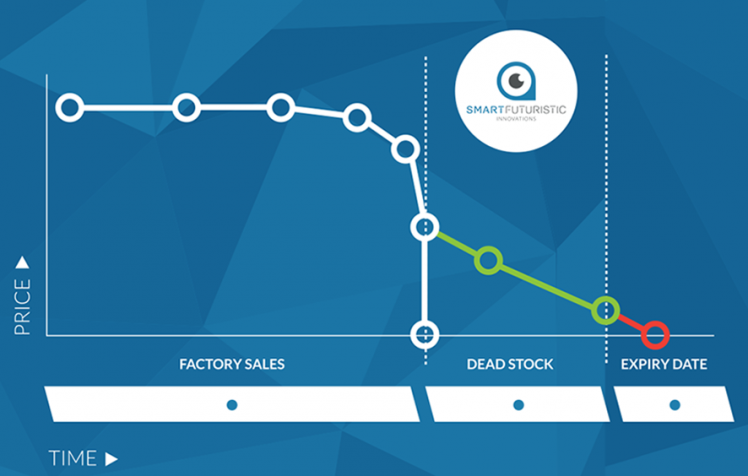Why there is no European Amazon, Google, Uber & Airbnb
When I started my online sales business with the enaA.com website in 1999, there was practically no legislation regulating this field. A grey area. Should I have waited for laws to be adopted in order to know how to work legally?
Seventeen years later and we are still far from having relevant laws in Slovenia which would support the development of online trading. All this in the country which has in the meantime succeeded in legalising same-sex marriages, the 21st country in the world to do so. I am proud of it. Really proud! I have also lived to see cannabis no longer being classified in the illicit drug class that attracts the most severe penalty and is now allowed to be grown and used for medicinal purposes. Slovenia is not exactly among the leading countries here but at least things have moved forward. We put the right to clean drinking water into the constitution.
And although European politicians refer to the development of the digital market as one of the most important generators of European economic growth, we online traders have so far received from them only legislation on web cookies, which has neither increased the volume of online sales in Europe nor improved user experience. Thus one cannot count on European companies to develop and compete with the American Amazon or the Chinese Alibaba. Sales of both companies to customers in EU countries have been growing steeply from year to year. Why? Because the countries of their origin have highly effective solutions regarding copyrights, customer protection, payment transactions and delivery, which allow for exceptionally low cost of selling throughout the world. Let us not forget that we are dealing here with a global retail sale with an average purchase price of about 20 euros in which every cent counts! Billions of contracts with the average value of peanuts. In Slovenia, the profit would already have evaporated during the administrative procedures related to re-export, VAT accounting, arrangement of copyrights and the costs associated with packaging waste and the destruction of electricity devices.
There may actually be only a handful of Slovenian photographers who sell their work on istock.com, yet every day there are more and more businessmen who know how to buy products in China and send them directly to Amazon warehouses in the USA to be re-sold from there. If we add to these Alibaba, eBay, Etsy and other similar online wholesale markets, this is not such a small business any more. But these marketplaces are not located in Europe and so the money goes other way.
Do we have legislation to regulate this? No. Are people who are doing this breaking laws? Not intentionally, for sure. Uber and AirBnB also want to operate their businesses legally. The fact that they are coming on to the market with a new business model should not be an obstacle. Both offer a very transparent operation, much more than, for example, issuing invoices in regular taxis or in renting rooms and suites via tourist associations on the Adriatic coast. Everything is electronic, everything is recorded. It is quite clear what the VAT value is, how much the operator gets and how much goes to the platform administrator. And then the state comes along to say that the business model is not entirely compatible with existing laws and regulations. Understandable. Of course. This is a new thing. We know. Don’t try to make me feel bad for driving with Uber. The sharing economy is an inevitable part of our present and the future. Write a new law. This is your business. The world is evolving! New business models are a constant. Write the best possible law so it will be talked and written about all over the world. Then the EU will become the e-centre of the world.
First published in Finance Manager (version for Slovene readers) http://manager.finance.si/8852131/Aljo%C5%A1a-Domijan-Zakaj-v-Evropi-ne-moremo-narediti-Alibabe-in-Amazona
How Slovenians Arrived in Silicon Valley
I spent the end of September in Silicon Valley. If the only thing you know about Google, Facebook, and Apple is that the first is a browser, the second a social network, and that the third makes smartphones and laptops, then you’re missing out. All these companies and a host of others are deeply involved in artificial intelligence, virtual reality, cars and more.
I left San Francisco airport and headed for San Jose by ordering an Uber. Uber cars have their own space at the airport where they pick up and drop off passengers, so as not to mingle with other taxi drivers. Even though traditional taxi drivers are on average almost twice as expensive, I think they still get at least ten times the number of passengers compared to Uber drivers. It stands to reason that only a small number of passengers, flying to Silicon Valley, actually have an Uber app on their smartphone, which is essential for calling one. Furthermore, I had the chance to see how traditional taxi drivers still dominated the space in front of the hotel and on the city roads. Uber is increasing its presence, but not nearly as fast as we would like to believe when we fret about taxi drivers losing their jobs overnight.
San Jose has transformed itself from a farming town into a global hub. Because the people wanted more. Because they wanted change.
All the largest car manufacturers in the world are moving parts of their R&D departments to Silicon Valley. Even though self-driving cars are already on the roads and it seems electric motors have emerged as clear winners, this is only the beginning. Will we still be buying cars or will we prefer to rent them? Will self-driving electric cars really be the only vehicles left on the road? What will they be like? What do the customers of the future want? What kind of solutions can manufacturers offer? This is why Silicon Valley is abuzz. Everyone is looking for the best user experience and computer software to run the new cars. Even the Chinese have come here. In a major way. They are buying up enormous areas for their companies and for their testing grounds. They went all out and bought NASA’s hangers. It is clear they want to seize the opportunity and become the automotive superpower of the future, when petrol and diesel internal combustion engines will no longer dominate the roads.
The world is not only changed by new technologies, but also by each passing generation. Partially because they don’t particularly like the things their parents thought most important, and partially because of a sense of urgency. They need to be concerned with how they’ll live in 70 or 80 years; they know that if nothing changes, their future holds a planet covered in at least two meters of plastic bottles where water and air are only available on prescription. They are aware they need to improve the way they exploit natural resources, which is why they find sharing things, when they don’t need to own them, second nature. The sharing economy has also caught on in more conservative business ventures, such as lending office space. WeWork is aiming to lend out approximately a million workspaces around the world by the end of 2017. As of late 2014, they had spaces at 27 locations. By the end of 2015, the number rose to 54. They were even awarded the title Most Innovative Company of the Year. They are currently opening seven to eight new locations per month. Anyone who rents a space with them becomes a member of a club. People from various companies who lease workbenches from them, socialize and help one another. The incredible melting pot of freelancers, start-ups, and small-business owners is already being further expanded by employees from large companies, like Pepsi Cola and Samsung. They want their workers to learn the business culture of the new generations, find potential co-workers and business partners.
At the grand opening of the – for now – fully Slovenian-owned ABC Global Home company in San Jose, a representative of the city, who visited Maribor 24 years ago, also said a few words. Her duty back then was to teach us how to transition from socialism to a market economy. She was visibly happy about how far we’ve come, that we came to her country and her city, and that we in turn can do something for them. She took the fact that we made it as something for granted. She was no longer our teacher, instead welcoming us as equal partners. After all, when she was born, her native San Jose was also not much more than a farming town. Today, it is one of the ten largest cities in the US and the capital of Silicon Valley. The rapid growth of high tech companies and the development of the electronics industry turned it from a farming town into a global hub at the turn of the millennium.
Because the people wanted more. Because they wanted change. Because they invested themselves, their strength, visions, energy and passion. There’s nothing you can’t accomplish with that! With only that!
First published in MANAGER FINANCE 13.10.2016 http://manager.finance.si/8850122/Aljo%C5%A1a-Domijan-Kako-smo-Slovenci-pri%C5%A1li-v-Silicijevo-dolino
Photo: Igor Domijan, Aguatera
Too Fast? It Will Go Even Faster
The rapid development of information technology and telecommunications over the past thirty years has been in fact a benefit of some sort. Whatever activity one was engaged in, be it in the public or private sector, an investment in some computer equipment, software applications and user training made it possible to optimize performance, reduce costs, improve quality and of course increase profit.
Naturally, some did this better than others. Slovenia and a lot of countries did not make the best of this opportunity and went down a few places on the global competitiveness scale. Nothing really dramatic. The cards on the global corporation map have shuffled even more. Apple, Google, Microsoft and Facebook became by far the largest companies in terms of market value in the world. Once the flagship, automotive industry, which is very close to and liked by the Slovenian population as well as perceived as an opportunity for economic growth, slid to somewhere below rank 20 on global list. An illustration that we are experiencing tectonic changes: US Ford and General Motors together are worth only slightly more than for instance Nike, McDonalds or Starbucks and much less than Coca Cola, Pepsi or P&G. All combined are worth less than Apple.
The company that will be the biggest in 20 years has yet to be founded. In the ABC Accelerator I have been following the growth of a new generation of successful companies practically in real time, seeing today that in a few years we will be buying differently, doing business with banks differently and communicating with the public administration differently, and we will have different relations with the electricity, water and heating suppliers … we will travel differently, select hotels differently, go to restaurants differently, undergo treatment differently, and so on. We will allocate most of the money to things we do not know yet today. The key to success is no longer growth and optimization. The companies and countries that don’t invest in novelties will fail completely, regardless of how successful they are and how much profit they make today. I am not talking about just one or a few changes. Even a country like Slovenia will need thousands.
I was surprised by the Chinese at the end of July. Theirs was the first country in the world to introduce online ride-booking regulations. The market with more than a billion users gave the green light to Uber and similar countries, making it clear they need not fear obstacles and pitfalls in winning the Chinese market. This is far from the European practice where mayors of individual towns decide about Uber, AirBnB and similar countries.
I was also surprised by Tesla. The Gigafactory producing batteries needed for its cars was set up in Nevada. At home! This is an excellent example of how innovative companies create jobs without looking for a cheaper labour force around the world. It is worth noting that in less than a year the factory will double the global battery output, only to quadruple it at a later stage, thus filling all Tesla 3 orders. Another trend that will have to be taken into account: foreign companies will no longer be able to create jobs with tax and similar benefits. A slightly different view of the entire matter reveals that investing in domestic knowledge is the only reliable path to a welfare state.
Let us have a look at how Romania boosted its high-tech industry. It reduced taxes, simplified accounting and made it easier to get credit. In a few months it succeeded in reducing unemployment, having recorded one of the lowest unemployment rates among the youth in the EU, ranking second in terms of GDP growth among the EU Member States and looks to have a good future. IT companies account for 6.1% of the country’s GDP and are expected to achieve 10% in 2017. It is important that Adobe, Microsoft, IBM, Intel and Oracle are opening their companies in Budapest because the favourable business conditions there also apply to all, both domestic entrepreneurs and global corporations, thus simplifying the opening of such companies and ensuring the conditions apply to the long-term.
And which country has witnessed the fastest growing GDP? Ireland, which has also reduced corporate income tax, attracted investors and boosted GDP to an incredible 26.3%.
The Russians will become the first to invest in Hyperloop, a new train offered by Elon Musk (Tesla, SpaceX, PayPal, …), operating at a speed of up to 1,200 km per hour. The construction will start in Siberia so as to connect Moscow and Beijing. Great Britain proved to be the most advanced when it comes to drone legislation. Amazon.com will therefore launch drone delivery there.
Who knows what will happen when the door to virtual reality opens really wide!
Original in Slovene Manager.Finance.si/8848155/Aljosa-Domijan-Tehnologija-drvi-kje-bomo-prvi-mi
Everything is changing (faster than you can imagine)
Fourth Industrial Revolution is characterized by a range of new technologies that are fusing the physical, digital and biological worlds, impacting all disciplines, economies and industries, and even challenging ideas about what it means to be human.
I dream about it.
Watch the best video about how everything is changing https://www.youtube.com/watch?v=khjY5LWF3tg
Six Top Technology Trends in 2016
When picking out the most major potentially disruptive tech trends for the new year, I always look at the predictions from the past couple of years. Last year, I drew attention to the Internet of Things, 3D printing, cloud computing, big data, security, data privacy and IT consumerisation. The predictions have all come true; only 3D printing is gaining ground slower than I anticipated.
The jobs we’ve all grown accustomed to are disappearing. Our environment is seeing an influx of people with customs and culture unknown to us. Global stock exchanges are behaving not unlike the fastest and most terrifying roller-coaster ride in the world, the Formula Rossa ride in Abu Dhabi. The news reports about the latest wars have all but replaced bed-time cartoons. We’re getting older: Barbie is already 57, while Tom and Jerry celebrated their 76th birthday this year. All three still have a regular job, only here and there allowing young people to shine.
With all that’s going on, it’s all too easy to forget that there have never been as many people thinking about how to make the world a better and kinder place for more than 10 billion inhabitants, destined to walk the Earth in 2050. At the moment, it seems like nothing special is happening. But this in itself is the greatest of illusions. We are destined to wake up one day, only to find a new futuristic London airport at the mouth of the River Thames; Tokyo will show off its 1.7 kilometre skyscraper, there will be a motorway stretching from London to Beijing, a railway line from Beijing to New York, a motorway traversing what today are inconceivable bridges through Norwegian fjords, there will be a new two-hundred kilometre canal from the Atlantic to the Pacific going through Nicaragua, and Gaudí’s Sagrada Família in Barcelona, under construction since 1882, will have finally been completed. There is no doubt all of this will be possible thanks to new technologies, encompassing everything from new materials and robots to artificial intelligence, virtual reality, 3D printing and modern means of transport.
Some things never change
Once again, as has been the case throughout the years, I have to predict that we will continue to write in MS Word and use MS Excel spreadsheets with almost 100% certainty.
Virtual Reality
When I first met Hrvoje Prpić, I told him that Trillenium somewhat premature. Yeah, a week or two :). However, Trillenium is today the leading builder of VR adventures for retailers.
In March 2014, Mark Zuckerberg once again demonstrated his incomparable prescience, compared to his one hundred billion in their pocket competitors, when he paid two billion dollars for Oculus Rift, what was then an almost non-existent company. This summer, Oculus Rift will release its VR devices for the high retail value of 599 dollars; consumers are expected to spend more than 5 billion dollars this year on playing in virtual reality (the number last year was 660 million).
However, this is not only about video games, even though the gaming industry is planning to not only expand its offer of VR games, but also move it into the cloud. This in turn will also expand the number of cloud services and the need to increase data-transfer rates through the Web and mobile networks. We will be faced with a completely new user experience which will probably no longer include TV screens, monitors, keyboards and PCs. All we’ll need is a smart phone and a virtual reality interface.
Due to all of the changes associated with it and with the consent of the X, Y, Z and millennial generations, virtual reality is the chief trend which will undoubtedly be followed and supported by technological progress in other areas.
Artificial Intelligence
Do you know Amy Ingram? Amy is AI powered personal assistant for scheduling meetings. You interact with her as you would with other person. Here you can get Amy for free.
When five years ago, Apple started equipping its smartphones with Siri, most users never even considered it was a form of artificial intelligence. In 2016, Amy, Siri, Google Now, Alexa and Cortana will become completely run-of-the-mill.
Nowadays, we are already used to computers doing more administrative tasks than people; they are better at seeing, hearing, recognizing patterns, etc. It will take some getting used to the fact that they will also be making better conclusions. It is a fact that only the crunching power of computers can find better solutions in big data by using software with artificial intelligence characteristics. IBM’s Watson is proof of this concept, while Amy, Siri and Cortana will offer a friendly helping hand when dealing with artificial intelligence.
Smart Devices
The expression “smart devices” is used for everyday products which collect data through Wi-Fi or Bluetooth networks and are controlled via smartphone apps. This year, a growing number of chairs, lawnmowers, refrigerators, cups of coffee and door handles will be sending out data. Most of them only collect data on when they are being used, for how long and at what time of the day; others also measure air humidity and temperature.
However, smart devices are also smart houses and the Internet of Things. If we look at it with an even wider angle, these devices also include robots, drones and, at the end of the day, smart cars. Simply put, computers will be everywhere. Everything will be interconnected. Devices will send and use data from the cloud. It’s up to us to get ready and take advantage of it.
Mobile Payments
Banks are behind with the times. Banks are cumbersome. So say the start-up companies looking to bring a breath of fresh air to how we pay for things. It’s a fact that banks are losing the payment transaction business. Goldman Sachs reports that financial start-ups will take over banking services worth at least 4.7 trillion dollars per year.
Investors had already detected this trend in 2014 and invested 12 billion dollars into new companies. Europe thus already has three unicorns – companies whose valuation has quickly exceeded a billion dollars: Adyen, Powa, and Skrill. On the global market, they will be forced to compete with Stripe, WePay, and Betterment.
This is not all down to the rigidity of traditional banks. The rapid growth of companies, such as Airbnb and Uber, is bringing new requirements to the financial services market. Such needs can only be met by new innovative companies. As a cherry on top, new entrants to the market are starting to use web-based and mobile services to offer better student loans and customer support for users without bank accounts. At the moment, this represents a pool of 2.5 billion people.
Media
An increasing number of users access media through Facebook, Twitter and other social networks; this means less and less people are accessing content through the media outlets’ home pages. According to Pew Research, this habit has been taken up by almost two-thirds of U.S.-based users. The phenomenon is only expected to grow. As is often the case, the rest of the world is certain to follow this trend in 2016. It’s interesting to note that analysts didn’t find any deviations among demographic groups. The trend exists with all generations, regardless of gender or social status.
The habits of television viewers have also been changing; they increasingly prefer to stream films and series via the Internet. This allows them to watch whatever they want, whenever they want it. In 2016, the obvious shift of attention to content-oriented users will represent a challenge for the mainstream media. They will need to figure out how to improve their offer, while retaining their popularity, visibility, and subscribers.
When Food Waste Turns into a Global Business
When, a few months ago, I heard SmartFuturistic speak for the very first time, story immediately appealed to me. Too much food is being thrown away, and if this can be reduced, however slightly, using a mobile phone application (these are, after all, the only applications that are made nowadays), it is worth listening to the idea and, if need be, help out. Can it be turned into a business? Perhaps.
Instead of complaining about the fact that some sellers and producers waste up to 30% of food left on their shelves, SmartFuturistic thought about what they knew and what they could do to solve the problem. The solution is the smartFuturistic application that helps producers and retailers sell their stock. The closer the “best before” date, the harder it is to sell. And all that is left when the date expires is the cost of discarding the food.
This is where SmartFuturistic comes in: the new application allows producers to extend the time of sale, thereby reducing the possibility of having to throw the food away. The algorithm helps sellers find the appropriate buyers and, in the event of reaching a deal, the most appropriate means of transport. Though the application was initially meant to be a shortcut to selling to larger clients, such as schools, kindergartens, hospitals, hotels, zoos and similar enterprises and organisations, it quickly became apparent that the solution also establishes connections between sellers and buyers over greater distances. Using SmartFuturistic, a German company can, for instance, sell its excess beer to China.
At this point, everything goes into overdrive. The SmartFuturistic team becomes one of the first eight companies to receive funding from the business ABC Accelerator, develops at a blistering pace over a period of three months and draws the attention of a large number of international investors on the presentation day. Not even a fortnight later, they come in second at the TechCrunch start-up competition (more on http://techcrunch.com/2015/07/13/budapestcrunch-ii-was-a-great-success) in Budapest.
Thanks to their extensive know-how and excellent solution, the future is wide open for the enthusiastic, well-organised team of SmartFuturistic. Anyone thinking of making it in the business world would do well to remember that SmartFuturistic’s solution is coming on the market at the right time. (Timing is important!) Well, maybe a second too early, just enough to get ahead of the competition. Which never hurt anyone. But the fact is that the world wants and needs this solution. It does not need convincing. The United Nations have adopted a plan to cut food waste by half by 2030, thereby reducing the number of starving people around the world. A few weeks ago, France passed a law prohibiting supermarkets from throwing away food that is past its “best-before” date. But that is only part of the problem. A large portion of food rots in the fields. I am glad that this issue has become a topic of discussion among European politicians, with similar laws being drafted in other EU Members states as well. I am even more glad, however, that SmartFuturistic and their investors have recognised this as a business opportunity. That is the best guarantee for reducing food waste.
Banks are losing the payment transaction business
In a few years, payment transactions and trade will be completely different from what we are used to.
If you are not buying things online and are not aware of the unbelievable growth of online sales, or if paying with PayPal still seems like a novelty to you, then you are behind the times. You probably do not know that there are new online retail companies providing services which attract more and more payment transactions. Will you continue to read if I promise to list three new European service providers whose individual worth exceeds EUR 1 billion?
The breathtaking growth of areas including online sales, cloud technology and the standardisation of devices (which allows virtually the same software to run applications on smart phones, tablets, computers, POS terminals and other devices) has enabled new service providers to enter the market as soon as they spot an opportunity. This time we are not talking about the sort of enthusiast that the market has a hard time understanding and accepting. We are talking about unicorns. I am not being romantic – this is the actual name given to start-ups who quickly achieve a worth of EUR 1 billion or more. Their businesses are shamelessly large, but even so, in Europe we have at least three unicorns in this sector alone.
Doubling the Volume of Business Each Year
Adyen (www.adyen.com) provides a seamless solution for mobile, online and in-store transactions, which enables merchants to accept almost any type of payment anywhere in the world. The solution is used in the largest stores and kiosks as well. Having received a financial injection worth USD 250 million from General Atlantic, Index Ventures and Felicis Ventures in December 2014, the company’s worth has been assessed around EUR 1.4 billion.
Its Dutch founders, Pieter van der Does and Arnout Schuijff, like to emphasise that as of yet they are not considering selling their company. And why would they? They double the volume of their business each year. At the moment, the company operates in 187 countries and their services are used by 3,500 global service providers, including Facebook, Burberry and Spotify. They can wait a few more years and then retire with EUR 30–50 billion in their pockets.
A Business Larger than Alibaba
Powa (www.powa.com) is a British unicorn. In June 2014, the company bought their smaller competitor, the Hong Kong-based MPayMe, for USD 75 million and expanded their services in the field of mobile payments. Although the purchase price amounted to the company’s sales over 2.5 years, it has proven to be a worthwhile investment. Today, Powa is worth around EUR 2.5 billion. Dan Wagner likes to boast that his business is larger than Alibaba.
Powa combines mobile payment services with online commerce services. PowaWeb provides cloud-based commerce services. PowaPOS is an application that transforms a tablet or smart phone into a cash register. PowaTag provides a new payment solution which is used by more than 1,100 service providers worldwide. All of these services operate online, offline and in physical shops – from the smallest boutiques to the largest shopping centres.
Banks Cannot Compete
Owners of Skrill (www.skrill.com) were less patient and sold the company to the London-based Optimal Payments for “a mere” EUR 1.1 billion. Skrill is in charge of payment transactions on eBay, Bet365 and Skype. In contrast to its competitors, Powa and Adyen, the company also provides money transfer for their users and operates in other fields where there are plenty of other unicorns.
If I reveal that Powa employs only 500 people, it becomes clear that banks simply cannot compete with the new services provided by these companies – companies which bring a new approach, quality and, above all, lower costs. In a few years, payment transactions and trade will be completely different from what we are used to.
Googlewise
Just as I was about to plant some raspberries, I turned to Google to find out when and how to do it. I love Google being able to understand questions such as When to plant raspberries? or When was George Washington born? or What is the capital of Moldova? Believe it or not, the programme for analyzing customer journeys to enaA.com also reveals very long questions. Several months ago, a customer entered the following query into Google: “Which LED TV set for less than €400 is best for kids and a living room of 5 x 4 metres?” Of course, Google knows that such TV sets are also featured on www.enaA.com, so the customer was referred to us.
But, is Google truly the tool or invention that will take the entire human race to the next level? This reminded me (without having to resort to Google to look it up) of an ancient story that was written around 400 BC. And yes, I would have to google the exact date.
Today, we tend to forget that in the beginning letters and words were not written down. Plato, through a dialogue between Socrates and Phaedrus, tells the legend of Thamus (alias Amun, Amun-Ra etc.), the ancient Egyptian king of gods, taking place at a time when people started to use writing.
At one time Thamus was host to the god Toth who was one of the most important Egyptian gods and the initiator of science and art, the inventor of numbers, mathematics, astronomy, astrology, geometry, botany, theology, medicine and writing. Toth boasted that writing would make the Egyptians wiser and give them better memories. Thamus replied: “The inventor is not always the best judge of his own inventions. Those using your invention will no longer train their memory and will become forgetful. They will put their trust in written sources when they want to retrieve information, and not to their memory. Your people will possess wisdom kept in records, and not their own wisdom. In time, there will be more and more records without any criteria or instructions. Rather than an advantage, such wisdom will become a burden. Instead of growing wiser, they will grow increasingly ignorant, instead of their memory becoming alive, they will neglect it and become forgetful.”
Let’s imagine Larry Page and Sergey Brin paying a visit to Thamus today. They would say how they had found a way to organize all the information in the world and make it available and useful to the whole world. They would conclude that from now on everyone can know everything.
Yet Thamus would reply: “Those who use your invention will no longer accumulate knowledge and will therefore know less and less. When they are curious about something, they will google it. They will boast about the knowledge that is stored on the world-wide web, and not what they themselves know to be true. In time, more and more knowledge will be at their fingertips without any criteria or instructions. Rather than an advantage, such knowledge will be a burden.”
Writing enabled mankind to evolve. So did the internet and Google, but don’t take everything that is written too literally! Let me just remind you of the copy-paste doctoral and masters theses, and the ease some people talk about things they know nothing about, apart from knowing that they are trending, not to mention politics. This is knowledge without criteria and instructions. This is boasting using someone else’s knowledge. Technology alone is therefore not enough to take us to the next level.
The Myth of the Borderless European Digital Market
So I buy a subscription to my favourite TV channel, drive to the seaside… and realise my subscription doesn’t work there. The seaside is in another EU country, my computer connects to a different Internet service provider there and the copyrights I have bought are only valid in Slovenia.
If I go for a vacation to Croatia (which, by the way, has the nicest seaside in the EU http://croatia.hr/en-GB/Homepage), this does not mean that I am interested in their local commercials for cars and offers for smart phones with subscriptions. If I was interested in any commercials on my vacation, it would be commercials from the country where I spend most of my time and spend most of my money. I am certain that advertising agencies understand this. Unfortunately, it seems that those who write regulations and draw up copyright contracts do not. From the user’s point of view, the whole thing is rather stupid, but in reality, there is much more to it. What it means is a breach of my basic right to use what I have bought anywhere and anytime I want.
Europe (whatever this means these days) promises the following on this page http://europa.eu/pol/singl/index_sl.htm (and not only on this page), and I quote: “In the EU’s single market (sometimes also called the ‘internal market’) people, goods, services, and money can move around the EU as freely as they do within a single country – instead of being obstructed by national borders and barriers as they were in the past. EU citizens can now study, live, shop, work and retire in any EU country. Or we can stay at home and enjoy a vast array of products from all over Europe.”
Sending Goods to Africa Is Cheaper than Sending Goods to Slovenia
Well, of course. You can sit down at a computer anywhere in the EU, browse online shops and buy a thing or two. Oh, but wait, here comes the catch: you soon realise that if you buy a book from Amazon.com, the cost of delivering the same book to the Italian side of the town, called Gorizia, is at least 20 percent lower than delivering the book to the Slovenian side of the same town, called Nova Gorica. If you look at http://www.amazon.co.uk/gp/help/customer/display.html?nodeId=11072981, you will also see that Amazon UK charges lower delivery costs for delivering the same book to South Africa than to Slovenia.
Even worse is the feeling when a Finnish server rejects you and states: “No, we do not sell to your country, this product is available only for us, the Germans, the Italians, the French and the English.” Even the largest and most modern online store of all, amazon.com, refuses to sell a number of things to Slovenia. But they only tell you this at the very end of the purchasing process:

You are, of course, welcome to order the product as poste restante to the neighbouring Italy or Austria. The reason for all of this is, for the most part, not knowing consumer rights in individual countries and the connected risks.
When, finally, you realise that the delivery cost from an online store in Klagenfurt (Austria) to Ljubljana (Slovenia) is several times higher than the delivery cost from Lendava (Slovenia), which is quite a few more kilometres further to the east, you really have to ask yourself where is this mythological single internal market whose benefits I am supposed to fully enjoy as a citizen of an EU country. How come that not all consumers from EU countries enjoy the same consumer rights? The borders have been down for a number of years. Why am I being discriminated as a consumer from Slovenia?
The European politicians claim that the development of a single digital market is one of the most important generators of European economic growth. Within this framework, in 2013 they implemented the regulation on website cookies which has not increased the volume of European online sales, nor has it improved consumer experience. Cross-border online sales account for only 14 percent of online sales, while the European consumers happily shop in non-European online shops.
The New “Cookies”
In Brussels, they have been setting up an extensive legislative reform which is supposed to make the matters even more complicated in the next two years, defining (among other things) what is and what is not allowed in terms of e-marketing. By doing so, the EU aims to place an additional burden on the EU retailers, whilst enabling unfair competition of virtually all global providers on the EU market.
Just like in the case of cookies, one cannot get rid of the feeling that they do not have a clue about what they are doing. For example, Microsoft has revealed that every minute they block more than 10 million spam messages aimed at the e-mail addresses of their company. You cannot solve this with legislation.
A Single Digital Market
As of yet, when it comes to online and mobile sales and marketing, we can only follow the technological solutions of American companies. Making just a few clicks reveals that the story about the borderless single European (digital) market is a myth. The Americans have a single market with 300 million users, whilst in the EU we have 28 markets with around 500 million users.
To ensure a single European digital market, Jean-Claude Juncker and his team ought to ensure a single postal system, a single copyright system, equal rights as regards product warranties, consumer protection and other consumer rights, so that all consumers within the EU could really, finally, sell and buy under the same conditions. A market of 500 million people is the basis for starting to develop our own solutions and our own user experience, which should be supported with appropriate legislation. As things are at the moment, Europeans seem to be their own worst enemy.
Slovenska verzija http://aljosadomijan.com/bajka-o-velikem-digitalnem-evropskem-trgu/
Telekomi kot komunalna podjetja
Prihodnost telekomov je prej v kategoriji komunalnih podjetij kot pa tistih, ki vodijo svetovni razvoj.
Dejstva, da v Evropi nimamo proizvodnje računalnikov, verjetno ni treba posebej poudarjati. Čeprav smo celo v Sloveniji imeli eno redkih tovarn mikro elektronskih vezij že leta 1977, v tistem času zelo iskane in strateške tehnologije, ki je igrala glavno vlogo v kar nekaj filmih o Jamesu Bondu.
Tega nam nikoli ni uspelo pretvoriti ne v velik posel ne v vsaj minimalno pozitiven poslovni rezultat. Iskra Mikroelektronika je bila kar 12 let podjetje v ustanavljanju, tako rekoč ves čas pa se je spopadala z izgubami, »prepočasnim prestrukturiranjem« in slabimi razvojnimi koncepti. (Javna tribuna Ljubljana Šiška, številka 296, letnik 29, 10. maja 1989). Podjetje so leta 1989 zaprli, napovedanega »tehnološkega parka za mikroelektroniko« pa nismo dobili nikoli.
Evropa je pokazala nekaj več, a tovarne, kot so bile Nixdorf, pozneje Siemens-Nixdorf, Olivetti ali pa Asem, so vse po vrsti hitro izgubile sapo in končale v rdečih številkah. Skratka: nič.
Bila je vsaj Nokia
Slab okus je popravila Nokia z mobilnimi telefoni. Evropa je, medtem ko so v ZDA gradili optična omrežja in internet, pravilno stavila na brezžičnost. Še vedno se spominjam začudenega obraza ameriškega carinika v New Orleansu, ko si je ogledoval moj mali Nokijin mobilni telefon, ki takrat v ZDA sploh še ni delal, saj tam niso imeli omrežja. A tudi to je zgodovina. Nokia je danes podjetje, ki mu ne more do vsaj delčka stare slave pomagati niti novi lastnik Microsoft.
Da, imeli smo tudi Skype. Omrežje in programsko opremo so razvili trije Estonci: Ahti Heinla, Priit Kasesalu in Jaan Tallinn leta 2003. Dve leti pozneje so ga prodali eBayu za 2,6 milijarde dolarjev. Od oktobra 2011 pa je za 8,5 milijarde v lasti Microsofta.
Idealni za računovodske module
Še vedno pa je večinoma evropski SAP SE (Systems, Applications & Products in Data Processing), podjetje s sedežem v Nemčiji in podružnicami v 130 državah ter po svetu razpršenimi delničarji.
Kar se mene tiče, to ni naključje. Evropska unija je s svojo nagnjenostjo k hiper regulaciji z zakoni, ki potem zahtevajo tudi ustrezen nadzor, naravnost idealna za podjetje, ki mora ves čas skladno s spremembami zakonodaje spreminjati računovodske module in dodajati nove. To znamo! Če se kje na svetu zbirajo najboljši tovrstni strokovnjaki, je to gotovo v Evropi. In tudi pri nas so programi za vodenje podjetij dober posel.
Travma evropskih telekomov
Brez strojne in programske opreme nam ostane le še telekomunikacijski sektor. V njem se obrača največji del IKT-denarja, a mu manjka širine, idej, prožnosti in inovativnosti. Da, lahko bi se spomnili in prvi ponudili storitve, kot je Uber ali Airbnb, lahko bi ponudili oblake, a dejstvo je, da so posli prihodnosti majhni in prožni, čisto druga zgodba kot telekomi, ki bi bili radi še večji in večji. In prav velikost je travma evropskih telekomov.
V Evropi je več kot 120 TK podjetij, v ZDA na primer le šest – toliko o tem, če še kdo dvomi, zakaj je treba prodati Telekom Slovenije. Cenovna vojna med njimi onemogoča gradnjo uspešnih poslovnih modelov. In medtem ko njihovi prihodki in dobički upadajo, podjetja, kot so Apple, Google, Skype, Facebook, WhatsUp, Twitter in podobni, služijo vse več. Apple na infrastrukturi telekomov zasluži toliko, da je danes sam vreden več kot sto svetovnih telekomov skupaj. Prihodnost telekomov je tako prej v kategoriji komunalnih podjetij kot pa tistih, ki bodo postavljala temelje svetovnega razvoja.
Podatki ne gredo po železnici
In tako smo bolj ali manj spregledali, da smo v zadnjih desetih letih tudi pri nas ostali tako rekoč brez večine uspešnih slovenskih IT-podjetij, brez dovolj širokega kroga strokovnjakov, ki bi danes znali opozoriti, da IKT-področje zanemarjamo, ter brez ljudi v krogih odločanja, ki bi temu znali prisluhniti.
Zato se zdi, da je vse lepo in prav. A ni! Medtem ko Angela Merkel že vodi Nemčijo v obdobje Industrije 4.0 (povezava digitalnih tehnologij, proizvodnje in logistike) in razume, da Evropa nima prihodnosti brez vidnejše vloge v digitalnem svetu, se mi ne sprašujemo niti tega, kdo bo financiral nadaljnji razvoj infrastrukture za hitrejši prenos podatkov. Ne, tega ni mogoče prevažati po železnici.
Prvič objavljeno 11. marca 2015 v časopisu Finance http://www.finance.si/8818705/Aljo%C5%A1a-Domijan-Telekomi-kot-komunalna-podjetja









